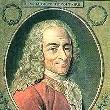About God – 5
June 16, 2010
Kindly read the first article of this series : https://rajeevne.wordpress.com/2010/06/14/about-god-1/
Emanuel Kant

So much has been written by and about Kant, that trying to bundle him in only a few lines is sheer injustice. Kant must be read in original.
Kant published his first book ‘The Critique of Pure Reason’ in 1781. It has since fueled imagination of many a philosopher, who later had their own interpretations about Religion and Theology. To name a few, philosophy of voluntarism of Schopenhauer and Nietzsche, intutionism of Bergson, pragmatism of William James, theories of Hegel, Spencer, Carlyle and many more covertly or overtly accepted the debt. Kant’s philosophy has survived.
So, what was so special about Kantian thought in his first book that his peers said “Has killed God” ??
- Experience tells us what is it (remember Socrates and Plato!), but not what it must be. Experience is gathered through events and sensations. Therefore General or Absolute Truths (e.g. mathematical formulae) must remain true, irrespective of our experience, because our mind is not made of passive wax, but an active organ which moulds and coordinates experiences into ideas, unity of thoughts.
- How do we transcend experience into knowledge? Through Sensation and Thought.
- First stage (Transcendental esthetics) – Through Perception of an object (coordination of sensory information, applying to them the Space and the Time).
- Second stage (Transcendental Logic) – Through Conception of a thought (coordination of perceived information, applying to them the causality and categories)
- All knowledge can therefore be expressed with the help of the three instruments or agents – space, time and causes.
- God, if treated as first cause, can be there because the causal chain must have an end, and God cannot be there because we cannot prove if the first cause is the first cause. Religion (soul is ‘incorruptible’, will is free to have ‘faith or belief’, God is above all reason and causality) should be explainable with the help of these three agents by theoretical analysis, which is not possible since Religion and God are inferred or hypothetical entities.
However, in his second book ‘Critique of practical reason’ he suggested answers for having ideal religion. This religion will be based on Morals (like selfless service, charity), Feelings and Absolute Irrefutable Truths that can be proven by reason. The duty of morality shall be paramount over beauty of personal happiness. Happiness of others will prevail over personal happiness. Above all, every follower shall embrace such duties out of their free will. If such religion based on Morality comes into being, there will be God.
His critics are very vocal about his volte face from atheism to theism.
Kant’s writings were considered derogatory to the church. He was reprimanded by the then cabinet and the Prussian king and Kant agreed to refrain from publishing when he was in 70s. Kant died at 79 in 1804.
About God – 4
June 16, 2010
Kindly read the first article of this series : https://rajeevne.wordpress.com/2010/06/14/about-god-1/
Voltaire
Voltaire ran a tirade against dogmas and the then practices in church throughout his life. He tries to trace the Christian religion to Greece, Egypt and India. The distinction between religion and superstition is the main theme of his thinking.
It is very difficult to abridge his treaties which should be read in original. To summarize his early writings,
- It is profligate to define what is God, Angels and Mind because we even do not know why we move our arms at will (- We know now a little!), and we do not know what matter is beyond what we see by a microscope. Let us first understand what matter is and then we can comment further.
- Even the best of mathematicians only made romances with Philosophy. However, it seems very presumptuous to deny that He exists.
- We can weigh, measure, observe – This is the natural Philosophy. Rest is fantasy.
- The first divine was the first rogue who met his first fool. However, since the religion has lasted for (then) 1700 years, it must be divine.
- I believe in a General Providence, a law which governs everything, but not a particular providence.
- Why mankind boasts that they alone are gifted with immortality and spirituality? If a peacock could speak tomorrow, he will definitely say that he has soul and it is in his tail.
- A society of atheists can exist, if only they are also philosophers.
- If God did not exist, it would be good to invent it. There should be God for my tailor, lawyer and my wife so that they deceive me less.
Later however, he agrees about his faith in ‘his’ God, a universal God, which persuades a man to do good, and that it is everybody’s creed to submit to God.
On death bed when a first priest arrived, Voltaire asked for his credentials. When the second priest refused to absolve Voltaire unless he wrote a confession, Voltaire dictated his last words as follows: I die adoring God, loving my friends, not hating my enemies and detesting superstition.


